Introduction
As part of this communications portfolio is to discuss, explore and compile a report on a topic of our choice. This report will be about Crohn's Disease.
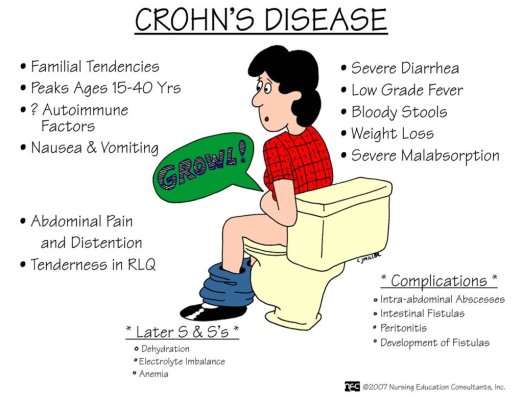
Terms of Reference
In this report research was carried out on Crohn's Disease. This report will explore and explain what the:
- Definition of Crohn's Disease is.
- Types of Crohn's Disease.
- Causes of Crohn's Disease are.
- Signs and Symptoms of Crohn's Disease.
- Diagnosis of Crohn's Disease.
- Diet for Crohn's Disease.
- Treatments used for Crohn's Disease.
Methology
This report will be complied by using secondary research methods, such as the internet, books, newspapers and class notes.




Findings
Definition of Crohn's Disease
Crohn's Disease is chronic inflammatory bowel disease also known as IBD. It causes inflammation of the lining of your digestive tract, which can lead to abdominal pain, severe diarrhoea, fatigue, weight loss and malnutrition. www.mayoclinic.org
Crohn's disease was named after an American Gastroenterologist Dr. Burrill Crohn, who first described the disease in 1932. Crohn's Disease can affect any part of the digestive tract but is most commonly found in the small intestine and the colon. Someone is usually diagnosed with Crohn's Disease before they are 30years of age but anyone can be diagnosed at any age.
Causes of Crohn's Disease
The cause for Crohn's Disease was unknown until recent. A Professor in London has recently linked the bacteria MAP (Mycobacterium avium patrauberculosis) which is found in the stomachs of cattle, pigs and sheep to Crohn's Disease and thinks mostly the cause of some peoples Crohn's Disease. Before this it was thought to be diet and stress related but these factors only aggravate the disease but are not the cause. It is possible that a virus or bacteria may trigger the disease. And in some cases it can be heredity. In mild forms it causes small shallow crater-like areas called aphtous ulcers and they develop in the inner surface of the bowel. In some more serious cases of Crohn's Disease they are deeper and larger ulcers and they cause scarring and stiffness sometimes resulting in narrowing of the bowel.
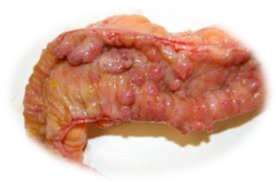
Some risk factors for the disease can be your age, most people with the disease before they are 30years of age. Non-steroidal anti-flammatory medication such as ibuprofen, naproxen and diclofenac sodium they do not cause Crohn's disease but they can lead to inflammation of the bowel and make the disease worse. Where you live can be a risk factor, people who live in an urban area or in an industriesed country are more likely to develop the disease. A diet high in fats or refined foods plays a role in Crohn's Disease.
Signs & Symptoms of Crohn's Disease
Crohn's Disease signs and symptoms usually develop gradually and often get worse over a period of time. It is very rare for the symptoms to develop suddenly and dramatically but it is possible in some people, and other people may have no signs or symptoms. When the disease is active some of the signs and symptoms can include:
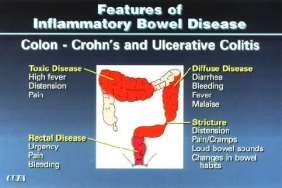
- Diarrhoea
- Fever
- Abdominal pain & cramps
- Fatigue
- Blood in your stool
- Weight loss
- Loss of appetite
- Mouth sores
- Perianal disease
- Feeling that your bowel is full even after bowel movement
- Feeling a frequent need to have a bowel movement
Some people often mistake these symptoms for food poisoning or an upset stomach. All these symptoms become more severe as the disease progresses. Crohn's Disease may lead to more complications in someone's health such as, bowel obstruction, ulcers, fistulas, anal fissure, malnutrition, colon cancer and many more. More server signs and symptoms people may experience would be:
- Inflammation of skin, eyes and joints
- Inflammation of the liver or bile ducts
- Delayed growth or sexual development in children
Diagnosing Crohn's Disease
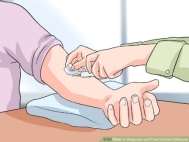
Your GP will ask you questions about the pattern of the signs and symptoms relating to Crohn's Disease and see if there are any contributing causes such as, diet, recent travel, any medication you may be on and family history. A number of tests may be carried out by your doctor before making a diagnosis of Crohn's Disease. The tests and procedures would include:
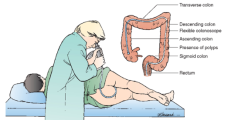
- A blood test
- Stool sample
- Colonoscopy examine
- Magnetic Resonance Imaging (MRI) scan
- Computerised Tomography (CT) scan
- Flexible Sigmoidoscopy
- Capsule Endoscopy
- Small bowel enema
Diet Recommended for Crohn's Disease
Changing your diet can help reduce the recurrence of the symptoms and lessen the severity but for someone who suffers with Crohn's Disease it is recommended to:
- Adjust their fibre intake but this is not always the case, some people a high fibre diet can aggravate their GI tract and if this happens they will need to swap to a low-residue diet.
- Limit their fat intake because Crohn's disease can affect their body's ability to breakdown and absorb fat and the excess fat will pass from their small intestine to their colon resulting in diarrhoea.
- Limit their dairy intake because having dairy can cause an upset stomach, cramps and diarrhoea for most people with the disease.
- Drink plenty of water to help their body stay hydrated because of the diarrhoea the body may be losing water their body needs.
- They need to consider alternative sources of vitamins and minerals because Crohn's Disease can affect their ability to absorb nutrients from their food properly and they would need to find multivitamins that would suit them.
- Their doctor would also refer them to a dietician or nutritionist to help create a well-balanced diet to suit them.
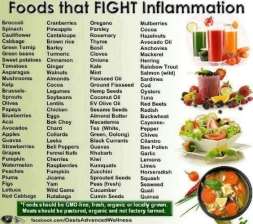
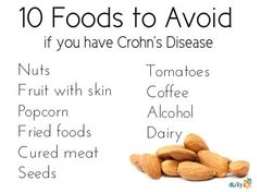
Treatment and Drugs for Crohn's Disease
For Crohn's Disease there is no cure available at the minute but in 5year's time there will be a cure available to people for Crohn's disease because a Professor called John Hermon-Taylor in St. George's Hospital London has developed a vaccine, and it has been tested successfully on animals and is in the second stage trials now. In the next 3years they will be ready to test it on humans. But treatments and drugs available now to help ease and control Crohn's Disease are:
- Anti-inflammatory drugs
- Immune system suppressors
- Antibiotics
- Over the counter medications
Some doctors may recommend a special diet to be given through a tube or nutrients given into the vein. And if diet and lifestyle changes and medication don't help he may recommend surgery on the damaged part of the intestine and reconnect the healthy sections, although this does not cure the disease it can just stops it temporarily.
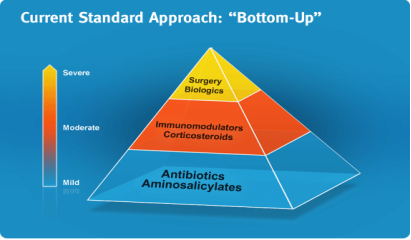
Conclusion
In my conclusion I learned that Crohn's Disease is a chronic inflammatory bowel disease and it is also known as IBD. I now know that Crohn's disease is named after Dr. Burrill Crohn. I learned that a Professor in London called John Hermon-Taylor linked MAP which is found in the stomach of cattle, sheep and pigs to Crohn's Disease and there will be a cure ready to be given in 5years. I learned that some people often mistake the signs and symptoms for food poisoning or an upset stomach. I learned what the test and procedures involved to diagnose someone with Crohn's Disease, and what diet is recommended for someone with the disease but this does not always help in some cases.
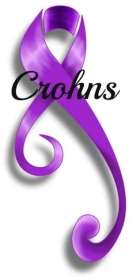
Recommendations
I would recommend that everyone who has been having signs and symptoms like the ones listed above should go and get checked by a doctor and would also recommend that they be tested for MAP.
Bibliography
http://www.healthline.com/health/crohns-disease 24/08/16 17:17
http://www.medicinenet.com/script/main/art.asp?articlekey=2866 24/08/16 18:05
http://www.mayoclinic.org/diseases-conditions/crohns-disease/basics/definition/con-20032061 24/08/16 18:45
http://www.mayoclinic.org/diseases-conditions/crohns-disease/basics/symptoms/con-20032061 24/08/16 18:57
http://www.mayoclinic.org/diseases-conditions/crohns-disease/basics/risk-factors/con-20032061 24/08/16 19:16
http://www.mayoclinic.org/diseases-conditions/crohns-disease/basics/complications/con-20032061 25/08/16 16:35
http://crohnsmapvaccine.com/vaccine/ 25/08/16 18:47
Images got from google image
Cite This Work
To export a reference to this article please select a referencing style below:
Related Content
All TagsContent relating to: "crohns disease"
Crohns disease is a kind of lifestyle disease. Crohns disease is also known as regional enterities. It is a type of inflammatory bowel disease. Crohn’s disease affects the end of small bowel (the ileum) and the beginning of the colon, but it may affect any part of the gastrointestinal (GI) tract, from the mouth to the end of the rectum.
Related Articles


